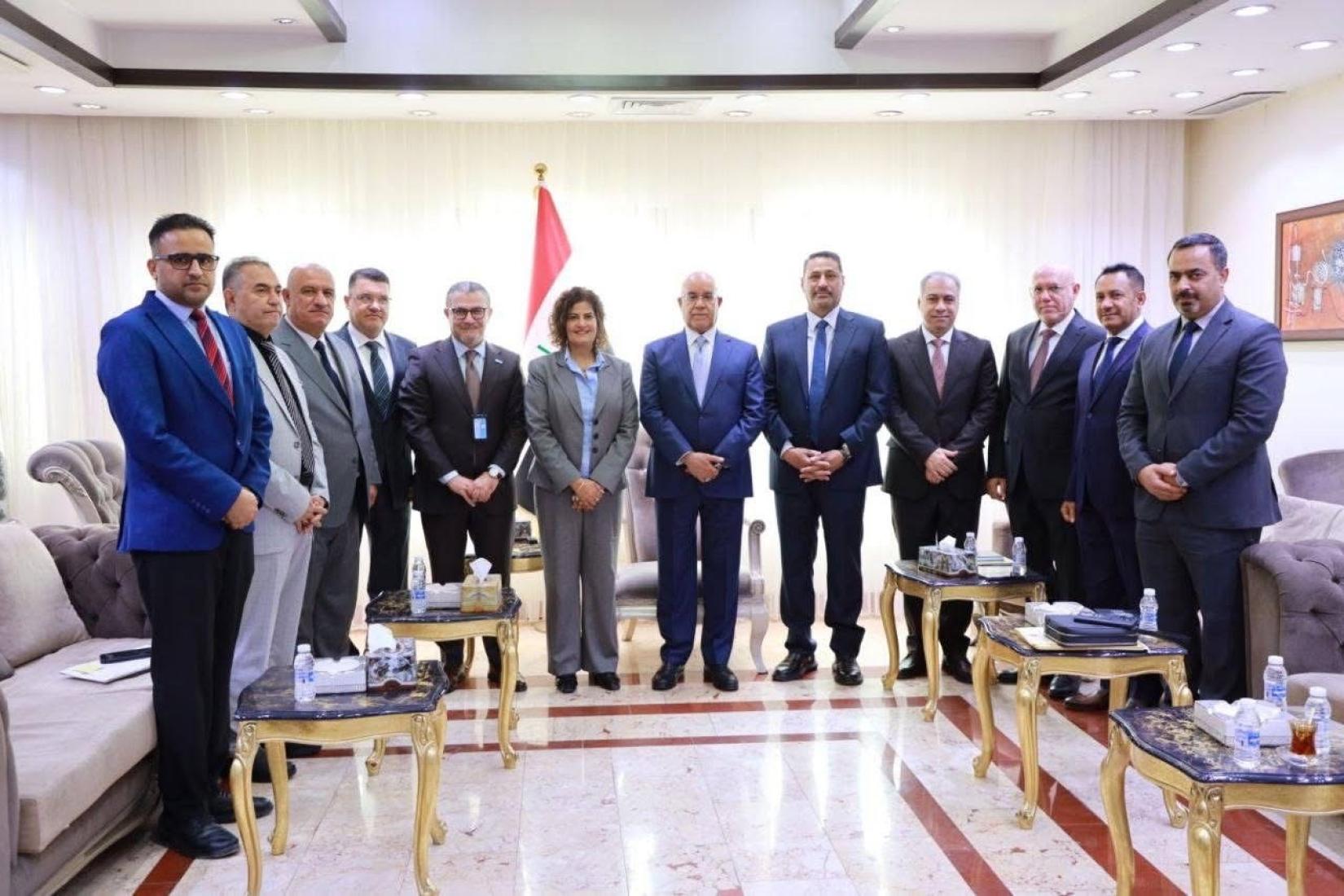Joint Statement by the Ministry of Health and the World Health Organization in Iraq on the Occasion of World Health Day 2025
10 April 2025
As we celebrate World Health Day, which coincides with the founding anniversary of the World Health Organization under the theme "Healthy Beginnings, Hopeful Futures", the Ministry of Health reaffirms its partnership with WHO through its commitment to improving public health by providing comprehensive primary, secondary, and specialized healthcare services.

In the area of health insurance, the Ministry has made a significant leap by endorsing and initially implementing the Health Insurance Law in Baghdad as a pilot step. In 2023, 300,000 individuals were covered in the first phase through 23 public institutions. In 2024, the number expanded to 776,000 insured individuals through 27 public institutions, along with the inclusion of private healthcare facilities under the law.
The Ministry has achieved qualitative milestones across multiple health areas, including the establishment and rehabilitation of health institutions:
- Opening of 15 new public hospitals (general and specialized), 184 wards, operating theaters, and clinics, 116 primary health care centers and homes, and 82 popular medical clinics across Iraq.
- Opening of over 43 specialized centers within two years, including centers for dialysis, cancer, diabetes, endocrinology, tuberculosis, hematology, dental care, and prosthetics manufacturing and supply.
- Rehabilitation and expansion of 164 hospitals, 21 specialized health centers, 86 primary care centers, and 28 ongoing health projects across provinces, with high completion rates expected to launch soon.
- 385 new health projects are currently underway across Baghdad and other provinces, most of which are nearing completion.
- Establishment of 3 new health sectors, 39 main centers, and 40 satellite centers for primary health care.
In developing primary healthcare services across Baghdad and other provinces, the Ministry has achieved the following:
- Converted 48 health centers to adopt the Family Health approach
- Activated 56 multidisciplinary health centers
- Offered family planning services at 127 outlets, including 8 centers of excellence
- Delivered early childhood development services at 709 primary health centers
- Established 160 monitoring sites for antimicrobial consumption in government institutions
- Expanded elder-friendly health centers by 75.2%
- Opened 26 geriatric clinics in public hospitals
- Provided mobile clinic services to remote areas through 68 mobile clinics
- Increased the number of neonatal screening centers to 1,090
- Launched and equipped school health units in 187 schools across Iraq
- Implemented two national campaigns to screen students and assess school environments in 2023 and 2024
- Conducted a national measles-rubella vaccination campaign in 2024 with government support
- Performed a national screening of detention centers for tuberculosis and HIV
- Rolled out the electronic health governance system (DHIS2) across 1,848 health institutions
Iraq has also earned several national and international recognitions, including:
- Declaration of Iraq as free from trachoma
- Transitioning from GPEI (Global Polio Eradication Initiative) support to national ownership, becoming the first country in the Eastern Mediterranean Region and globally to do so
- Gaining international accreditation for its Field Epidemiology Training Program (FETP) at both advanced and intermediate levels, becoming the first country worldwide to receive dual accreditation
- Joining the Alliance for Transformative Action on Climate and Health (ATACH)
- Receiving accreditation for several national laboratories, including microbiology, clinical chemistry, measles and rubella, influenza, polio, bacteriology, and newborn screening labs within the Central Public Health Laboratory
The Ministry continues to provide preventive services for communicable diseases, public health inspections, and health education and promotion across all primary healthcare centers.
Regarding modern hospital management, the Ministry has advanced by contracting international expert companies to manage 7 modern hospitals, including:
- Al-Shaab Hospital (Baghdad)
- Imam Al-Sadiq Hospital (Babil)
- Al-Sayyab Hospital (Basra)
- Imam Al-Hassan Al-Mujtaba Hospital (Karbala)
- Martyr Al-Hakim Hospital (Maysan)
- Al-Najaf Al-Ashraf Hospital (Najaf)
- Al-Nasiriyah Hospital (Dhi Qar)
Iraq has also made significant progress in maternal, neonatal, and child health between 2018–2023. National health indicators have shown tangible improvements, such as:
- Reduction of maternal mortality to 29.6 per 100,000 live births
- Neonatal mortality down to 10.5 per 1,000
- Under-five mortality down to 19.7 per 1,000 live births
- Mortality from noncommunicable diseases (NCDs) between ages 30–70 reduced to 2.7
- Mortality from tuberculosis decreased by 50% compared to 2015
Additionally, Iraq has maintained:
- Elimination of local malaria, polio, and schistosomiasis cases
Further actions taken by the Ministry include:
- Expanding maternal and neonatal services in remote and conflict-affected areas
- Increasing national investment in reproductive, maternal, and child health programs
- Developing and implementing a comprehensive national strategy under the Universal Health Coverage framework
- Launching digital tools to monitor pregnancy and child health
- Strengthening community awareness, and partnerships with civil society and local stakeholders
With support from the World Health Organization and partners, Iraq is also working on:
- Strengthening health information and early warning systems
- Enhancing the capacity and protection of health workers
- Developing strategies to address climate change, mental health, antimicrobial resistance, and emergency preparedness
For enquiries:
Dr. Ahmed Al-Imam
Health Promotion/Community Engagement Assistant
World Health Organization (WHO)
Baghdad, Iraq
Mob: +964 7837400052
Email: alimama@who.int


